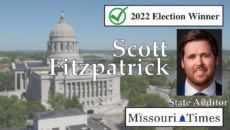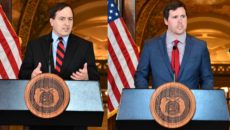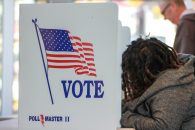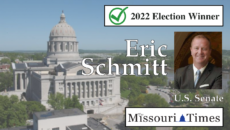JEFFERSON CITY, Mo. — Having the most money, the right endorsements, and the “right” experiences is not a guaranteed recipe for getting elected in the Show-Me State according to the results from the 2018 primary.
Saundra McDowell beat three candidates to win the Republican nomination for state auditor, Rep. Karla May defeated incumbent-Sen. Jake Hummel, and Ian Mackey won the Democratic nomination for HD 87 against a candidate with nearly twice the treasure chest.
While there was unexpected and expected results around the state, droves of Missourians showed up to vote for the primary. According to the Secretary of State’s Office, of the roughly 4.1 million registered voters, about 33.5 percent of them cast a ballot. Turnout in the previous two primary elections, in August 2014 and August 2016, was about 25 percent.
Part of the increased turnout could be attributed to races were Missourians deeply invested: the potential to become a right-to-work state, county level elections that draw eyes from around the state, and, to a lesser extent, the U.S. Senate seat up for election.
The most votes cast on Tuesday’s primary was for Proposition A. More than 1,380,000 voters cast their ballot on the right-to-work issue that each side has spent millions on. In the end, the referendum was soundly defeated with 937,241 (67 percent) no votes and 452,075 (33 percent) yes votes.
In the hotly contested U.S. Senate race, Josh Hawley handily came out the victor of the 11-candidate field to win the Republican nomination. Incumbent-Sen. Claire McCaskill also easily secured the Democratic nomination. More Missourians cast their ballot of this primary race than the 2016 gubernatorial primary — 1,275,981 and 1,013,179 respectively.
The County Executive race in St. Louis has been heated for months and came down to the wire between incumbent Steve Stenger and Mark Mantovani, with Stenger winning the Democratic primary. Both candidates spent millions on the race — $3 million and $2 million, respectively — and the unofficial results are within a one percent margin. With 100 percent of the precincts reporting, 91,487 votes went to Stenger and 90,330 votes went to Mantovani.
The increased voter turnout wasn’t the element to the 2018 primary election that set it apart: voters chose a very diverse set of candidates that include a large number of women to represent them.
One of the biggest surprises of the night was Rep. Karla May beating incumbent Sen. Jake Hummel. As of the last MEC filings, May’s campaign was “limited activity” whereas Hummel’s team was in the group with full literature, mailers, and staff.
In the race for the Republican nomination to become state auditor, Saundra McDowell came out on top. McDowell was greatly outspent by David Wasinger. According to the latest Missouri Ethics Commission filings, Wasinger spent $425,000 on the race compared to McDowell’s $36,000. She will face incumbent Nicole Galloway in the general election.
In House District 97, Mary Elizabeth Coleman, a political newcomer and mother of six, beat out a labor-backed candidate who served on the city council for years to win the Republican nomination. She will now face Rep. Mike Revis, who currently has the fundraising advantage, in November.
LaKeySha Bosley was out spent by J.P. Johnson — $6,095.42 to $12,644.95, repestectively — and still came out ahead in HD 79. Raychel Proudie beat two men to secure the Democratic nomination for HD 73.
On the Senate side, political outsider Cindy O’Laughlin beat three state representatives for the Republican nomination for SD 18.
While there were several instances — clustered around urban areas — where the elections defied expectations, a multitude of races followed logical progression. Rep. Bill White beat Rob O’Brian for the SD 32 GOP nod and Tony Luetkemeyer won the SD 32 Republican nomination over Harry Roberts.
The large increase in voter turnout that the primary saw is unlikely to carry through to November to the same extent. There is no ballot measure that invokes the same response as right-to-work. Medical marijuana, minimum wage increases, and ethics reform may motivate more people to cast ballots, but the likelihood that increase is the same 8 percent increase Tuesday saw isn’t expected.

Alisha Shurr was a reporter for The Missouri Times and The Missouri Times Magazine. She joined The Missouri Times in January 2018 after working as a copy editor for her hometown newspaper in Southern Oregon. Alisha is a graduate of Kansas State University.



























